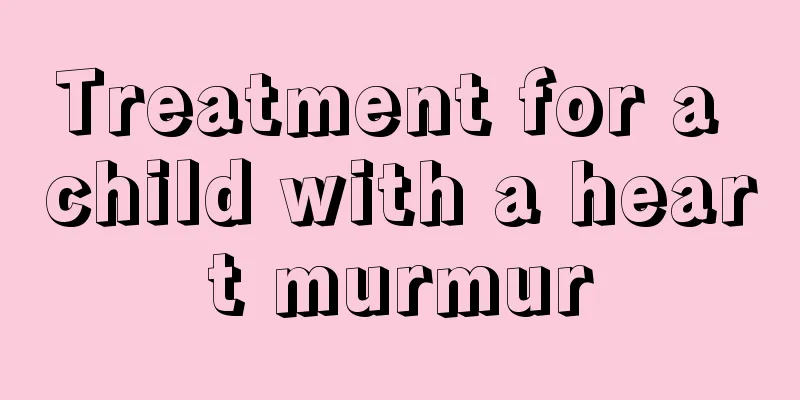What should I do if my child is short in height?

|
As we all know, a child's weight and height are more or less related to genetic factors. If parents are overweight, their children are likely to be fatter in the future. If parents are tall, their children will definitely not be short in the future. In addition, a child's height is also related to nutritional supplements and diseases. So, what should parents do if their children are short? 1. Genetic factors: The characteristics, potential, trends, and limits of children's growth and development are all affected by the genetic factors of both parents. Generally speaking, babies born to tall parents are taller than babies of the same age born to short parents. 2. Nutrition: It is one of the important factors affecting children's growth and development. Adequate and well-balanced nutrition is the material basis for children's growth and development. Malnutrition will first lead to the fact that children's weight does not increase or even decreases, which will eventually affect height growth and the functions of other body systems, such as immune function, endocrine function, and neural regulation function. The younger the age, the greater the impact. Therefore, it is necessary to scientifically handle the combination of meat and vegetables, coarse and fine grains, and animal and plant proteins, and pay attention to the frugal use of oils and sugars to produce a balanced diet structure. 3. Disease: The impact on children's growth and development is also very obvious. Acute infection often causes weight loss or no weight gain, while chronic infection affects the growth of both weight and height. Endocrine diseases often cause delayed bone growth and nervous system development. Congenital diseases have a significant impact on children's physical and intellectual development. 4. A good living environment and sanitary conditions such as plenty of sunshine, fresh air, and clean water are beneficial to the growth and development of children. Otherwise, it will have adverse effects. A reasonable living system, care, education, and exercise also play an important role in promoting children's growth, development, and intelligence. What foods help children grow taller? 1. Protein is the basis of life Various tissues and organs are made up of protein, such as muscle tissue, internal organs, brain tissue and many important life substances, such as hemoglobin, coagulation protein, antibodies that support immunity, etc. in the blood. Therefore, it is undoubtedly very important to choose high-protein foods such as lean meat, fish, milk, soybeans, eggs, etc. 2. Proper mineral supplementation is very important for bone lengthening Minerals such as calcium, phosphorus, and magnesium are the most basic elements that make up the bone structure. Data show that 99% of two-thirds of the minerals in the bones are made up of the above three minerals. Therefore, sufficient and appropriate mineral supplementation is very important for bone lengthening. Calcium-rich milk and fish are the first choice for children's diet. In addition, the role of some important trace elements cannot be ignored, such as iron and zinc. These elements can regulate the growth and development of children in many aspects of life activities. Therefore, animal offal, fish, and nuts rich in these trace elements are worth recommending and worth considering. 3. The nutrients that play the most important role in providing energy are fat and fatty acids The development of height is one of the important indicators of growth and development, which shows that adequate fatty acid intake is necessary. Unless the child's weight exceeds the standard weight by 25% and reaches the obesity index, the child's choice of fatty food should not be strictly restricted. Of course, scientific selection is necessary. You should choose more natural foods high in essential fatty acids, such as fish, eggs, etc. It is recommended not to eat too much high-fat foods, such as cream, butter, etc. |
<<: What to do if your child has eye pain
>>: Why does a three-year-old child cry when sleeping at night?
Recommend
What are the dangers of excessive foreskin in adolescents
Generally speaking, surgical treatment is often u...
Treatment of dacryocystitis in children
If a child has any disease, many parents are at a...
What are the symptoms of sensory integration disorder in children?
The so-called sensory integration disorder is cal...
Why do newborn babies have yellow eyes?
The eyes are the windows to the soul, and childre...
What should I do if my child’s teeth bleed?
Bleeding teeth is a very common phenomenon. We of...
Why is the child late in speaking?
Many parents report that their children start spe...
What is the most scientific way to supplement vitamin AD for infants?
Vitamins are one of the elements that no one can ...
What is considered a fever in children?
It is not uncommon for children to have fever in ...
How often do newborns urinate?
Urinating is a phenomenon that the human body nee...
What causes polio?
The so-called paralysis refers to the situation w...
What should I do if my child has nasal mucus?
What should I do if my child has nasal mucus? I b...
How many months is it best to supplement zinc for babies?
The baby's nutrition must be reasonable to en...
How to treat breast development in boys
Breast development occurs in many boys. Unlike in...
Is hand, foot and mouth disease contagious?
Many people think that hand, foot and mouth disea...
Symptoms and treatment of anxiety in children
In today's society, more and more children ha...









